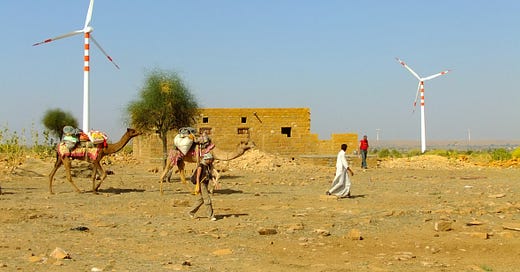Last week I interviewed Fadhel Kaboub, former Associate Professor of Economics at Denison University where he researched political economy, decarbonisation, colonialism, and the financial and agricultural policies necessary to facilitate a global—and just—green transition. Since recording, Fadhel has been appointed Under-Secretary-General for Financing for Development at the international intergovernmental organisation, Organisation of Educational Cooperation.
During the episode, Fadhel explains the three structural weaknesses of the global south, as exploited and perpetuated by the global north. I think these points are so critical to understanding the failures of global capitalism and the traps of debt and inflation, they’re worth laying out in today’s piece. Critically, these traps—which create a structural trade deficit—block global south countries from developing their own renewable economies, inhibiting both the global, green transition, and equitable development.
1. Food sovereignty
If a nation does not have control over its food production, it will always be dependent on other nations for importing its food, and thus dependent on global supply chains, which have been proven weak during the pandemic. And if you’re at the mercy of another country in order to feed your people, you don't have the sovereignty to make decisions about the future of your country.
Africa, was once the bread basket of Europe, now imports 85% of its food.
Why? Because of the Common Agricultural Policy.
Upon granting nations in Africa their independence, European leaders recognised the danger of Africa’s strong position as the world’s food supplier. They realised that they needed food sovereignty, because they’d been importing the vast majority of their food from their colonies. In order create, and then maintain, food sovereignty, European nations (along with Australia, the United States and Japan) decided to subsidise the production of crops produced on home soil, ensuring crops produced at home can be sold at a cheaper price, thus outcompeting African products on the market.
However, this also made European products outcompete African products in Africa, rendering the former breadbasket one of the largest food importers in the world. It is simply cheaper to buy European food than pan-African crops.
2. Energy Sovereignty
The case for energy sovereignty has been easily made by Russia’s war in Ukraine (alongside arguments to nationalise exploitative energy companies). Nations dependent on one another and global supply chains for their energy are vulnerable.
The energy crisis has hit British residents terribly hard, one of the most “advanced” economies in the world, because the government is unwilling to nationalise companies which have taken advantage of the crisis to widen their profit margins. People in the UK are rationing their energy and heat supply in order to survive financially. Imagine what a lack of energy sovereignty does to developing nations who are even more vulnerable to market whims and corrupt leaders?
3. Low-Value Added Manufacturing
Low-value added manufacturing, or assembly line manufacturing, means the only manufacturing a nation can participate in doesn’t add enough value to their economy because they are still importing more than they export. This applies to many developing nations, including much of Africa, who are dependent on importing the machines and parts needed to create and maintain its assembly line.
Structural Trade Deficit
Fadhel explains these three traps create a structural trade deficit, and a down pressure on the local currency, making it weak. When the government then goes to the central bank to ask them to help, the central bank responds by buying foreign reserve currencies and, in doing so, “imports inflation”.
Broken Promises
The global north is currently extracting $2 trillion annually from the global south, a number which far outstrips the annual $100 billion in climate finance promised by the global north at Copenhagen’s COP in 2009. OECD countries have fallen short on that paltry promise of funds every year.
Simply, the global south must be liberated. Not only do these countries deserve the sovereignty to establish their own national futures, the climate crisis is so urgent and catastrophic that we need all hands on deck to figure it out. The global south must no longer take the brunt of the global north’s consumption, emissions, demands and fear.
Emissions vs Equality
Current international policy calls for cooperation on the climate crisis whilst shackling the majority of the world’s brain power and creativity in debt. Leaders warn against industrial development on the other side of the world whilst looking to the market for solutions. Given the evidence of post-colonial strategies deliberately binding the global south to the global north’s decisions, one can only wonder if, at the heart of global north policy, is the plan for the world’s richest 1% to live like kings at the expense of everyone else.
According to a recent Oxfam report, the carbon footprints of the richest 1% is set to be 30 times greater than the level compatible with the 1.5°C goal of the Paris Agreement by 2030. That’s just 80 million people belching out 16% of the world’s total emissions. Surviving the climate crisis demands limiting the world’s most privileged.
Allowing the global south to thrive would necessitate dampening our appetite whilst improving the quality of life for 600 million people. Frankly, it's a win-win situation, and it’s the only situation in which we create a sustainable future.
The problem is waiting for leaders to see the value in that which doesn’t carry a price tag.




